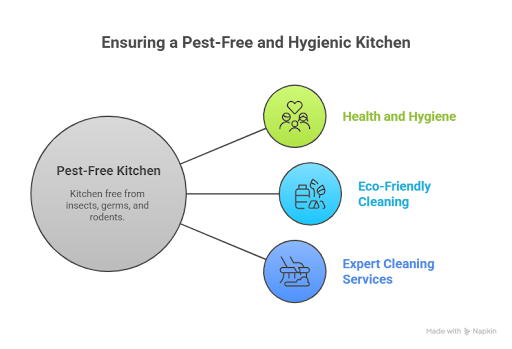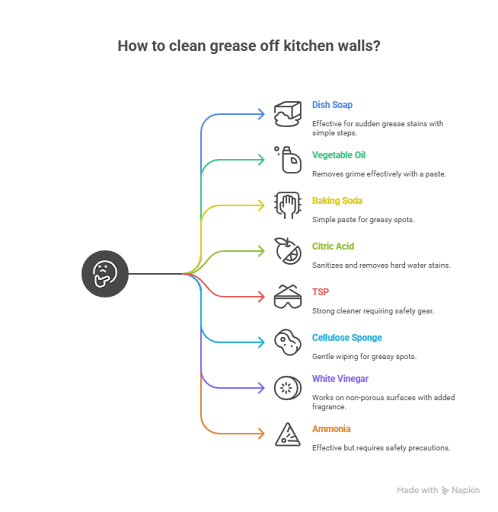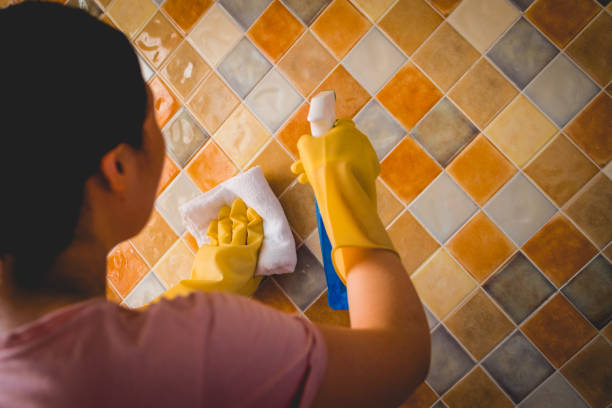Good food and hygienic cooking go together. Cleanliness in the kitchen is the most important step towards hygienic food and preparation. From cabinets to cook-tops, chimneys, and sink, we remove the most stubborn dirt and grime during everyday cleaning.
Did you know? A recent survey shows that 2 in 3 Indians clean their homes 5–7 times a week, making India the highest frequency among Southeast Asian countries. Nearly half of the respondents have increased their cleaning routines in recent years (source).
It is important to keep insects away if you want to serve healthy and hygienic food to your family. With the help of our cleaning experts, you get a cooking space that is free from germs and rodents responsible for severe illnesses. Our experts use eco-friendly products for kitchen cleaning. Made from organic raw materials, these cleaning solutions have no allergens and are safe for every household.

Health Note: Inhaling cooking oil fumes, which contain harmful substances like polycyclic aromatic hydrocarbons (PAHs) and formaldehyde, can lead to respiratory issues, cardiovascular problems, and even increase the risk of lung cancer over time (source).
Best Ideas to Clean Grease Off Your Kitchen Walls

Despite being careful when cooking, oil splatters everywhere. Even when you wipe down every surface in the kitchen, most of us are not inclined to do it. Here are some effective ways to clean grease off your kitchen walls:
Using Vegetable Oil
Vegetable oil can help remove grime effectively. Mix one part vegetable oil with two parts baking soda to make a paste. Apply it on the walls with a damp cloth, wash with warm water and dish soap, rinse, and dry with a clean cloth.
Using Baking Soda
Make a paste using baking soda and warm water. Apply it to greasy spots using a sponge, scrub, and wipe with a damp cloth.
Using Citric-Acid Based Cleaner
Citric acid helps sanitize, disinfect, and remove hard water stains. Mix a few teaspoons of citric acid in water, spray on the walls, scrub with a sponge, and rinse.
Using TSP (Trisodium Phosphate)
TSP is a strong cleaner—use gloves and goggles to protect yourself. Mix ¼ cup of TSP with one gallon of warm water, let it sit on the wall for 2 minutes, scrub, and rinse thoroughly.
Using Cellulose Sponge
Wipe greasy spots with a cellulose sponge in circular motions, part by part, and wipe each area with a dry cloth.
Using White Vinegar
Soak a sponge in vinegar and wipe the grease. It works on non-porous surfaces like metal and glass. Add a few drops of lemon juice for fragrance.
Using Ammonia
Ammonia works well but can irritate eyes, nose, and skin. Use gloves and goggles to protect yourself while cleaning.
Why You Need to Hire Aquuamarine for Kitchen Deep Cleaning Services
Without the necessary cleaning tools and equipment, it is difficult to make your kitchen look sparkling clean. Hiring professional deep cleaning services saves time, ensures safety, and delivers effective results. When you book deep cleaning services in Bangalore from Aquuamarine, our experts use the best equipment and eco-friendly cleaning solutions.
Safety Note: Over 61% of reported home cooking fires are due to grease buildup, according to the National Fire Protection Association (source). Professional cleaning reduces this risk significantly.
With these methods, you can remove grease off kitchen walls effectively and enjoy a sparkling clean kitchen.
Frequently Asked Questions
1. What’s the easiest way to remove sticky grease from kitchen walls during kitchen deep cleaning?
The easiest method is to mix a few drops of dish soap in warm water and wipe the walls with a soft sponge. Dish soap breaks down grease quickly without damaging paint—an essential step in any kitchen deep cleaning routine.
2. Can I use vinegar to clean greasy kitchen walls during kitchen deep cleaning?
Yes, white vinegar works wonders. Mix equal parts vinegar and warm water, spray on greasy areas, let sit for a few minutes, and wipe clean with a damp cloth.
3. How do I clean tough, old grease stains from kitchen walls when doing kitchen deep cleaning?
Make a paste using baking soda and water. Apply it to the greasy spots, let it rest for 10–15 minutes, and gently scrub.
4. Will cleaning kitchen walls during deep cleaning damage the paint?
No. Use mild cleaners and soft cloths, and avoid harsh chemicals or abrasive scrubbing.
5. How often should I clean my kitchen walls as part of kitchen deep cleaning?
Include wall cleaning every 2–3 weeks, especially near the stove, to prevent thick grease buildup.
6. Is it okay to use baking soda and vinegar together during kitchen deep cleaning?
Yes, but use them in steps: baking soda first, then vinegar to rinse residue. This enhances cleaning results.
7. Which is better for kitchen deep cleaning—homemade cleaners or professional products?
Both work. Homemade cleaners like vinegar and baking soda are safe and affordable, while professional degreasers save time for tough grease.


 Book from the website and get a
Book from the website and get a




